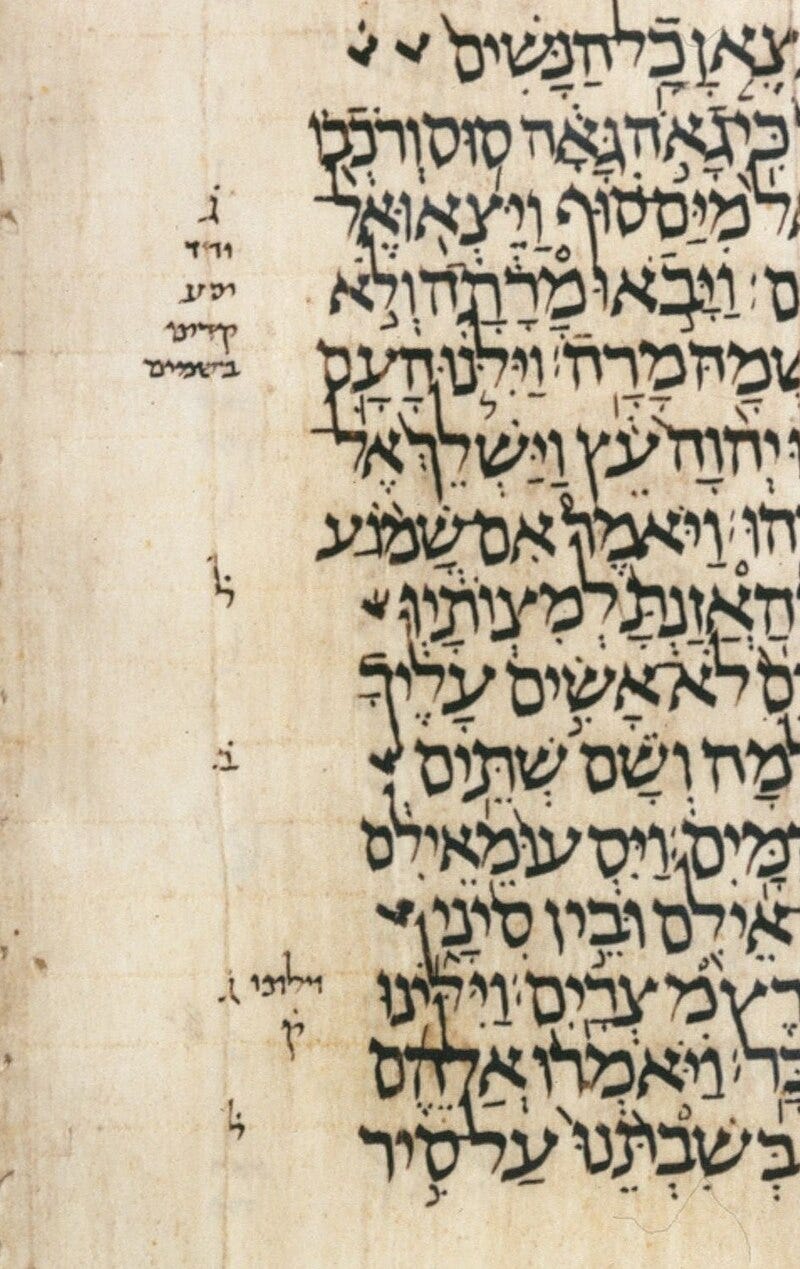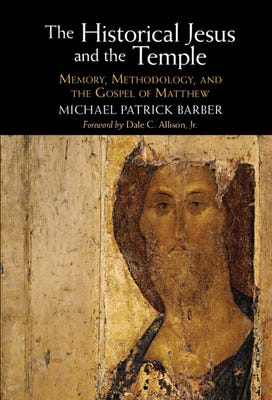Does MATTHEW Teach Jesus Is God? 25 Passages in Matthew Identifying Jesus with the Old Testament God
PLUS Does Alex O’Connor make a valid criticism of Wes Huff?
Find us on Medium.com
Or X
Or Insta:
instagram.com/streettheologianapologetics/
1. Matthew 1:23- God With Us- Is. 7:14, 9:6, Mal. 3:1-2
2. Matthew 3:3- The Lord for whom the messenger prepares the way- Is. 40:3
3. Matthew 3:12- The Judge with a winnowing fork- Jer. 15:7, Mal. 4:1, Job 21:17-18
4. Matthew 5:27-28- Expanding God’s Law and Saying “I Say to you” on His own authority- Exodus 20:1
5. Matthew 7:21-23- Lord, Lord- a name only for God in the Septuagint- Deut. 3:24, Ezek. 37:3 PLUS Jesus as the Final Judge- Joel 3:12 and Psalm 96:13
6. Jesus’ Words as the Unshakeable Foundation (Matthew 7:24-25) - YHWH as the Rock (Deuteronomy 32:4, Isaiah 28:16)
7. Matthew 8:26-27- The One who stills the raging storm- Ps. 89:9
8. Matthew 9:2-6- The One who forgives sins and knows your inner thoughts- Is. 43:25, 1 Sam. 16:7
9. Matthew 11:10- The Lord for whom a messenger prepares the way- Mal. 3:1
10. Matthew 11:28- The One who gives rest- Exodus 33:14, Deuteronomy 12:9-10, Psalm 62:1
11. Matthew 12:6- Greater than the Temple who God dwells- 1 Kings 8:27
12. Matthew 12:8- Lord of the Sabbath- Exodus 20:8-11
13. Matthew 13:36-43 - Jesus separates the righteous from the wicked (Zephaniah 1:3, Joel 3:13) and sends out His angels like YHWH (Psalm 103:20, Zech. 1:10-11)
14. Matthew 14:33- Jesus receives worship only due to YHWH in Exodus 34:14
15. Matthew 14:22-33- Walking on Water and saying “I AM” - Job. 9:8, Is. 43:16, Ex. 3:14, 34:14
16. Matthew 17:1-8- God finally reveals his face to Moses and Elijah- Ex. 33:20-23, 1 Kings 19:11-13
17. Matthew 18:20- Jesus is omnipresent- Jer. 23:23-24
18. Matthew 19:16-22- Why Call Me Good? Jesus says you are lacking something if you follow the commandments but don’t follow Him -Ex. 20:3
19. Matthew 19:28-29- The Eternal King and Divine Son of Man- Dan. 7:13-14, Ps. 47:8, Ps. 103:19
20. Matthew 21:16- Jesus makes a passage about YHWH about Him while receiving praise- Ps. 8:1-2
21. Matthew 22:41-46- The Pre-Existent King- Psalm 110:1
22. Matthew 24:30-31- The Divine Son of Man who comes with the clouds in glory and sends His angels- Dan. 7:13-14, Psalm 103:20, Psalm 104:3, Zech. 1:10-11
23. Matthew 25:31-46- The Glorious King who separates the sheep from the goats- Ezekiel 34:11-22
24. Matthew 26:63-66- Jesus is condemned to death for claiming to be God- Daniel 7:13-14, Ps. 110:1
25. Matthew 28:18-20- The Omnipresent Eternal King with all authority and who possesses the very name of God- Ps. 24:1, Is. 45:23, Deut. 6:4, Is. 42:8
CLOSING SECTION: Who do you think Jesus is?
Despite substantial evidence throughout the New Testament, many again and again claim the New Testament does not teach Jesus is God.
Leading New Testament scholar Bart Ehrman has claimed Jesus is not presented as divine in Matthew, Mark and Luke. However, he has flip flopped on this several times!
O’Connor critical of Wes Huff and says Jesus is not God in Matthew
Famous YouTuber, Alex O’Connor, criticised Wesley Huff for asserting on the Joe Rogan podcast that Jesus claimed to be God. O’Connor also contends Jesus is not presented as divine in Matthew, Mark, and Luke.
O’Connor claims, “Nowhere in Mark, Matthew, or Luke does Jesus actually claim to be God in his own words.”
Old Testament Influence
I propose part of the problem is many of us in the 21st century are very unfamiliar with the strong influence of the Old Testament on the first century writers of New Testament books.
The New Testament books are full of explicit references to, and implicit connections with, the Old Testament.

Old Testament God is Multi-Personal
A second part of the problem is that many fail to realise the God of the Old Testament is presented as a multi-personal being. I have written about this elsewhere:
The Old Testament for example references YHWH being sent by YHWH (Zech. 2:8-11). YHWH raining sulphur and fire from YHWH (Gen. 19:24).
The Son of Man riding in the clouds and having an eternal kingdom and dominion when these are things attributed to God (Dan. 7:13-14). The angel of the LORD (eg. Ex. 3:2-4) and the Spirit of the LORD (eg. 2 Samuel 23:2-3) being called the LORD (or similar), yet also being sent by the LORD (eg. Ex. 23:20-21, Is. 63:11-12).
Who is Jesus? Lord, liar, lunatic, or legend?
A third part of the problem is many find it hard to make a choice in the Lord, liar, lunatic or legend quadrilemma. Jesus is associated with too much wisdom to be merely dismissed as a liar or mad man.
There is broad and varied historical support for the life of Jesus and the claims of the apostles.
As such, rather than admit Jesus is Lord, many will then try and suggest the statements of Jesus and His apostles were not really pointing to Jesus being Lord.
With all that in mind, let’s dive in. In this article we will be starting with the Book of Matthew.
For more on Mark and Luke read the below:
1. Matthew 1:23- God With Us- Is. 7:14, 9:6, Mal. 3:1-2
In Matthew 1:23, Jesus is called “God with us”. This fulfils YHWH’s promise of His presence with His people (Isaiah 7:14).
While the Isaiah 7 passage is partially fulfilled in Isaiah 8 through the birth of Maher-shalal-hash-baz, Isaiah subsequently points in Isaiah 9 to the child who will have an everlasting kingdom and will be called Mighty God (Is. 9:6-7).
Mighty God or El Gibbor is a title used to describe the God of Israel in the very next chapter (Is. 10:21). Moreover, in Malachi 3:1-2 God Himself says He will come and visit His temple (Mal. 3:1-2). This was a reference to the second temple that existed at the time of Jesus.
2. Matthew 3:3- The Lord for whom the messenger prepares the way- Is. 40:3
John the Baptist says he is fulfilling Isaiah’s prophecy about the one preparing “the way of the Lord.” Except Isaiah 40:3 that John the Baptist is quoting is referring to preparing the way for YHWH! Yet, John is contextually saying he is preparing the way for Jesus.
3. Matthew 3:12- The Judge with a winnowing fork- Jer. 15:7, Mal. 4:1, Job 21:17-18
John the Baptist says regarding Jesus in Matthew 3:12:
"His winnowing fork is in his hand, and he will clear his threshing floor and gather his wheat into the barn, but the chaff he will burn with unquenchable fire."
Here, John is apples OT imagery concerning YHWH to Jesus, demonstrating that Jesus is doing what only YHWH does in the Old Testament in separating the wheat (saved) from the chaff (destroyed) as Judge. Note the examples below:
Jeremiah 15:7 – YHWH as the One Who Sifts the People
"I have winnowed them with a winnowing fork in the gates of the land; I have bereaved, I have destroyed my people, yet they did not turn from their ways."
Malachi 4:1 – YHWH’s Unquenchable Fire
"For behold, the day is coming, burning like an oven, when all the arrogant and all evildoers will be stubble. The day that is coming shall set them ablaze, says the LORD of hosts, so that it will leave them neither root nor branch."
Job 21:17-18 – The Wicked Are Like Chaff Before God's Judgment
"How often is it that the lamp of the wicked is put out? That their calamity comes upon them? That God distributes pains in his anger? That they are like straw before the wind, and like chaff that the storm carries away?"
4. Matthew 5:27-28- Expanding God’s Law and Saying “I Say to you” on His own authority- Exodus 20:1
In every man’s favourite verse of the Bible, Jesus claims in Matthew 5:27-28:
“You have heard that it was said, ‘You shall not commit adultery.’ 28 But I say to you that everyone who looks at a woman with lustful intent has already committed adultery with her in his heart.
Here, Jesus expands on God’s law speaking on His own authority.
Notice he says “I say to you” then issues an implied command (not to look on a woman with lust). He doesn’t say thus says the Lord.
This is similar to how YHWH speaks in the Old Testament, on his own authority, without intermediary.
Exodus 20:1—God Himself Speaks His Law
"And God spoke all these words, saying…"
5. Matthew 7:21-23- Lord, Lord- a name only for God in the Septuagint- Deut. 3:24, Ezek. 37:3 PLUS Jesus as the Final Judge- Joel 3:12 and Psalm 96:13
Jesus explains:
“Not everyone who says to me, ‘Lord, Lord,’ will enter the kingdom of heaven, but the one who does the will of my Father who is in heaven. 22 On that day many will say to me, ‘Lord, Lord, did we not prophesy in your name, and cast out demons in your name, and do many mighty works in your name?’ 23 And then will I declare to them, ‘I never knew you; depart from me, you workers of lawlessness.’
Here your eternal destiny depends on how you respond to Jesus and Jesus is the Final Judge.
In Joel 3:12, YHWH says:
Let the nations stir themselves up
and come up to the Valley of Jehoshaphat;
for there I will sit to judge
all the surrounding nations.
In Psalm 96:13, we read concerning YHWH that “he comes, for he comes to judge the earth. He will judge the world in righteousness, and the peoples in his faithfulness.”
LORD, LORD
The phrase "Lord, Lord" (Κύριε, Κύριε – Kyrie, Kyrie) in Matthew 7:21 is significant in establishing Jesus' divine identity, especially in light of its Old Testament background.
Jesus claims: “Not everyone who says to me, ‘Lord, Lord,’ will enter the kingdom of heaven, but the one who does the will of my Father who is in heaven. 22 On that day many will say to me, ‘Lord, Lord, did we not prophesy in your name, and cast out demons in your name, and do many mighty works in your name?’ 23 And then will I declare to them, ‘I never knew you; depart from me, you workers of lawlessness.’
Dr. Jason Staples, a scholar of Second Temple Judaism and early Christianity, has pointed out that:
The phrase “Kyrie, Kyrie” (Κύριε, Κύριε) in Jewish contexts typically refers to YHWH.
When Jesus applies this to Himself, it signals that He is assuming the divine title and authority of YHWH.
In fact, in the Greek Septuagint, “Kyrie, Kyrie”, is used to refer to God as YHWH Adonai. Jesus here is applying this same term to Himself.
As Michael Patrick Barber explains in The Historical Jesus and the Temple p.60, “the double vocative, ‘Lord, Lord [kyrie, kyrie] is applied to Jesus in the Sermon on the Mount (Matt. 7:21). As Jason Staples has shown, this expression always represents an allusion to the Tetragrammaton [YHWH] in the Septuagint. In places where the Hebrew has ‘Adonai YHWH’, the Septuagint has kyrie, kyrie (cf. eg. Deut. 3:24; Ps. 108:21 LXX [109:21 MT]; Ezek 37:210.”
6. Jesus’ Words as the Unshakeable Foundation (Matthew 7:24-25) - YHWH as the Rock (Deuteronomy 32:4, Isaiah 28:16)
Matthew 7:24-25 – "Everyone then who hears these words of mine and does them will be like a wise man who built his house on the rock... And the rain fell, and the floods came, and the winds blew and beat on that house, but it did not fall, because it had been founded on the rock."
Note the below passages in the Old Testament:
Deuteronomy 32:4 – "The Rock, his work is perfect, for all his ways are justice. A God of faithfulness and without iniquity, just and upright is he."
Isaiah 28:16 – "Behold, I am the one who has laid as a foundation in Zion, a stone, a tested stone, a precious cornerstone, of a sure foundation: ‘Whoever believes will not be in haste.’"
In the Old Testament, YHWH is the rock and sure foundation. Jesus now claims this role for Himself—an implicit claim to divinity.
7. Matthew 8:26-27- The One who stills the raging storm- Ps. 89:9
Matthew 8:26-27: And he said to them, “Why are you afraid, O you of little faith?” Then he rose and rebuked the winds and the sea, and there was a great calm. 27 And the men marveled, saying, “What sort of man is this, that even winds and sea obey him?”
Yet, in the context of Psalm 89:8-9, YHWH is the One who stills the raging storm and there is no one like Him!
Psalm 89:8-9: Who is like you, LORD God Almighty?
You, LORD, are mighty, and your faithfulness surrounds you.
9 You rule over the surging sea;
when its waves mount up, you still them.
8. Matthew 9:2-6- The One who forgives sins and knows your inner thoughts- Is. 43:25, 1 Sam. 16:7
Matthew 9:2-6: And behold, some people brought to him a paralytic, lying on a bed. And when Jesus saw their faith, he said to the paralytic, “Take heart, my son; your sins are forgiven.” 3 And behold, some of the scribes said to themselves, “This man is blaspheming.” 4 But Jesus, knowing their thoughts, said, “Why do you think evil in your hearts? 5 For which is easier, to say, ‘Your sins are forgiven,’ or to say, ‘Rise and walk’? 6 But that you may know that the Son of Man has authority on earth to forgive sins”—he then said to the paralytic—“Rise, pick up your bed and go home.”
Two things to note here- first Jesus has authority to forgive sins. In Isaiah 43:25, YHWH is the One who blots out transgressions. YHWH is the One who redeems or saves (Is. 44:22).
Second, Jesus knows their thoughts when knowing thoughts is something God does, not man (eg. 1 Sam. 16:7, Psalm 139:23).
9. Matthew 11:10- the One for whom a messenger prepares the way- Mal. 3:1
Jesus says regarding John the Baptist:
This is he of whom it is written,
“‘Behold, I send my messenger before your face,
who will prepare your way before you.’
However, Jesus here is quoting Malachi 3:1, which is about a messenger preparing the way for YHWH!
Mal 3:1: Behold, I send my messenger, and he will prepare the way before me. And the Lord whom you seek will suddenly come to his temple; and the messenger of the covenant in whom you delight, behold, he is coming, says the Lord of hosts.
Jesus in context explains how John the Baptist in effect prepared the way for Jesus. Thus, Jesus is identifying himself with YHWH from Malachi 3:1 for whom a messenger prepares the way.
10. Matthew 11:28- the One who gives rest- Exodus 33:14, Deuteronomy 12:9-10, Psalm 62:1
Jesus says: Come to me, all who labor and are heavy laden, and I will give you rest.
However, in the Old Testament, it is YHWH who gives rest.
In Exodus 33:14, YHWH says, “My presence will go with you, and I will give you rest.”
Deuteronomy 12:9-10 echoes a similar idea. Psalm 62 outlines a similar principle with God alone providing an unshakeable foundation of rest.
11. Matthew 12:6- Greater than the Temple who God dwells- 1 Kings 8:27
Jesus says, in reference to Himself, “something greater than the temple is here.” Yet, in 1 Kings 8:27, Solomon’s temple is described as the place of God’s dwelling (though it cannot contain Him).
As such, Jesus claims He is greater than the dwelling place of God!
12. Matthew 12:8- Lord of the Sabbath- Exodus 20:8-11
In Matthew 12:8, Jesus says:
For the Son of Man is lord of the Sabbath.
Yet, who is Lord of the Sabbath in the Old Testament? YHWH.
Exodus 20:10 reads, “the seventh day is a Sabbath to the LORD your God.”
13. Matthew 13:36-43 - Jesus separates the righteous from the wicked (Zephaniah 1:3, Joel 3:13) and sends out His angels like YHWH (Psalm 103:20, Zech. 1:10-11)
Matthew 13:40-42 reads: Just as the weeds are gathered and burned with fire, so will it be at the end of the age. 41 The Son of Man will send his angels, and they will gather out of his kingdom all causes of sin and all law-breakers, 42 and throw them into the fiery furnace. In that place there will be weeping and gnashing of teeth.
However, in Joel 3:13, it is YHWH who uses the sickle to separate in judgement.
Put in the sickle, for the harvest is ripe. Go in, tread, for the winepress is full. The vats overflow, for their evil is great.
Thus, Jesus again parallels Himself with YHWH as final judge. Moreover, in the Old Testament it is YHWH who sends out or leads His angels (eg. Psalm 103:20, Zech. 1:10-11).
14. Jesus receives worship only due to YHWH in Matthew 14:33 (compare Exodus 34:14).
In Matthew 14:33, after Jesus walks on water and calms the storm, His disciples “worship Him, saying, “Truly you are the Son of God.” ”
This is significant because Exodus 34:14 states:
“For you shall worship no other god, for the LORD, whose name is Jealous, is a jealous God.”
Since worship is reserved for YHWH alone, yet Jesus accepts worship without rebuke, this is a clear affirmation of His divine identity.
The disciples recognize His authority over creation (walking on water, calming the storm), and their response is to worship Him—something only appropriate for YHWH.
15. Matthew 14:22-33- Walking on Water and saying “I AM” - Job. 9:8, Is. 43:16, Ex. 3:14
In Matthew 14:25 we read, "And in the fourth watch of the night He came to them, walking on the sea."
In the Old Testament, only YHWH has power over the sea:
Job 9:8 – "Who alone stretched out the heavens and trampled the waves of the sea."
Psalm 77:19 – "Your way was through the sea, your path through the great waters; yet your footprints were unseen."
Isaiah 43:16 – "Thus says the LORD, who makes a way in the sea, a path in the mighty waters…"
Jesus does exactly what YHWH does—walking on the sea as a sign of His divine power.
Moreover, in Matthew 14:27, "But immediately Jesus spoke to them, saying, 'Take heart; I am (ἐγώ εἰμι); do not be afraid.'"
This phrase "I AM" (ἐγώ εἰμι) is the Greek equivalent of YHWH’s self-revelation in the Old Testament:
Exodus 3:14 (LXX) – "God said to Moses, 'I AM (ἐγώ εἰμι) WHO I AM.' And He said, 'Say this to the people of Israel, "I AM (ἐγώ εἰμι) has sent me to you.’”
While one could argue this is a reference to Jesus simply stating it is Him, the fact this statement is made in the context of walking on water, followed by providing a divine reassurance to not be afraid and subsequently receiving worship, adds more weight to the notion Jesus here is making a claim to divinity.
This aligns perfectly with Isaiah 43:1-2, where YHWH says, "Fear not.. When you pass through the waters, I will be with you."
16. Matthew 17:1-8- God finally reveals his face to Moses and Elijah- Ex. 33:20-23, 1 Kings 19:11-13
Matthew 17:2-6: And after six days Jesus took with him Peter and James, and John his brother, and led them up a high mountain by themselves. 2 And he was transfigured before them, and his face shone like the sun, and his clothes became white as light. 3 And behold, there appeared to them Moses and Elijah, talking with him. 4 And Peter said to Jesus, “Lord, it is good that we are here. If you wish, I will make three tents here, one for you and one for Moses and one for Elijah.” 5 He was still speaking when, behold, a bright cloud overshadowed them, and a voice from the cloud said, “This is my beloved Son, with whom I am well pleased; listen to him.” 6 When the disciples heard this, they fell on their faces and were terrified. 7 But Jesus came and touched them, saying, “Rise, and have no fear.”
Both Moses and Elijah both experience theophanies in the Old Testament, whereby God comes to them on a mountain and reveals his glory. Yet, neither Moses nor Elijah can see God’s face.
“You cannot see my face.. You shall see my back, but my face shall not be seen.” — Ex. 33:20,23
“And he said, “Go out and stand on the mount before the LORD.” And behold, The LORD passed by.. when Elijah heard it, he wrapped his face in his cloak.” — 1 Kings 19:11,13
In the transfiguration accounts, they finally get to see God’s face on a mountain! Jesus’ true identity as God’s Son is revealed (Matthew 17:5). In Jesus of Nazareth, God has a human face!
Just as God spoke to Moses and his people, descending in a “thick cloud” (Ex. 19:16, 40:34), a cloud overshadowed all present in the transfiguration event as Jesus’ identity was revealed (Matthew 17:5) in a cloud.
Moreover, the disciples response of fear in the presence of divine glory is reminiscent of the fear caused by the presence of God’s glory in the Old Testament (eg. Is. 6:5).
17. Matthew 18:20- Jesus is omnipresent- Jer. 23:23-24
Matthew 18:20, “For where two or three are gathered in my name, there am I among them.”
How can Jesus be anywhere where two or three are gathered in His name unless He is able to everywhere (aka omnipresent)?
This mirrors YHWH being “at hand” in Jeremiah 23:23-24:
“Am I a God at hand, declares the LORD, and not a God far away? 24 Can a man hide himself in secret places so that I cannot see him? declares the LORD. Do I not fill heaven and earth? declares the LORD.
18. Matthew 19:16-22- Why Call Me Good? Jesus says you are lacking something if you follow the commandments but don’t follow Him -Ex. 20:3
A common objection to the divinity of Jesus, sceptics raise is the account of the rich young ruler. Jesus asks him in Matthew 19:17, “Why do you ask me about what is good? There is only one who is good?”
Many sceptics fail to read this passage in its entirety. From what follows it is evident Jesus is testing the rich man to see if he actually thinks Jesus is divine.
Follow Me- God’s command
How do I know this? Look at verse 20-21. Jesus after hearing from the rich man if he has kept the commandments (v.20), urges him (v.21), “If you would be perfect, go, sell what you possess and give to the poor, and you will have treasure in heaven; and come, follow me.”
In other words, Jesus is adding, forsaking all to follow him to the very commands written by God! You can’t follow God’s commands and not follow Jesus and what he says! The man’s obedience to God is lacking unless he forsakes all to follow Christ.
What a blasphemous claim for a man to make! Unless, of course, Jesus is God..
By implication, Jesus is suggesting this man has other gods before Jesus (cf. Ex. 20:3)!
This interaction points directly to the divinity of Jesus—only God could claim to be the standard of goodness and demand the total, sacrificial obedience that Jesus calls for in this passage. Jesus isn’t merely reinforcing the Old Testament law; He’s positioning Himself as the authoritative figure to whom one must give allegiance, reinforcing that He is God incarnate.
19. Matthew 19:28-29- The Eternal King and Divine Son of Man- Dan. 7:13-14, Ps. 47:8, Ps. 103:19
Matthew 19:28-29: Jesus said to them, “Truly, I say to you, in the new world, when the Son of Man will sit on his glorious throne, you who have followed me will also sit on twelve thrones, judging the twelve tribes of Israel. 29 And everyone who has left houses or brothers or sisters or father or mother or children or lands, for my name's sake, will receive a hundredfold and will inherit eternal life.
By making a reference to the Son of Man from Daniel 7:13-14, sitting on his glorious throne, Jesus is making a claim to divinity. The Son of Man has an eternal kingdom like God (Dan. 4:34), is served by the nations like God (Is. 45:23) and comes in the clouds like only YHWH does (Is. 19:1).
Moreover, in Psalm 47:8:
God reigns over the nations; God sits on his holy throne.
In Psalm 103:19:
The LORD has established his throne in the heavens, and his kingdom rules over all.
In this passage, Jesus is ruling on a glorious throne like YHWH and also determines whether or not someone receives eternal life (Matt. 19:29).
20. Matthew 21:16- Jesus makes a passage about YHWH about Him while receiving praise- Ps. 8:1-2
Speaking of the praise Jesus received, we read in Matthew 21:16, “and they said to him, “Do you hear what these are saying?” And Jesus said to them, “Yes; have you never read, “‘Out of the mouth of infants and nursing babies you have prepared praise’?”
Turn to Psalm 8:1–2 and you will see that again Jesus is applying a YHWH passage to himself! “O LORD, our Lord, how majestic is your name in all the earth! You have set your glory above the heavens. Out of the mouth of babies and infants, you have established strength because of your foes, to still the enemy and the avenger.”
Jesus thus equates himself to YHWH as referred to in Psalm 8.
21. Matthew 22:41-46- The Pre-Existent King- Psalm 110:1
In Matthew 16, Peter calls Jesus the Christ and Jesus affirms this title being used to describe Him. In Matthew 22, Jesus asks the Pharisees a question about the Christ (or Messiah/ Anointed One) that points to His pre-existence.
Matthew 22:41-46: Now while the Pharisees were gathered together, Jesus asked them a question, 42 saying, “What do you think about the Christ? Whose son is he?” They said to him, “The son of David.” 43 He said to them, “How is it then that David, in the Spirit, calls him Lord, saying,
44 “‘The Lord said to my Lord,
“Sit at my right hand,
until I put your enemies under your feet”’?
45 If then David calls him Lord, how is he his son?” 46 And no one was able to answer him a word, nor from that day did anyone dare to ask him any more questions.
Here Jesus is quoting Psalm 110:1 to demonstrate that the Christ, though being a descendant of David, must also exist before David to be David’s “Lord”.
Furthermore, in Psalm 110, David’s Lord sits at YHWH’s right hand, implying divine co-rulership with YHWH.
22. Matthew 24:30-31- The Divine Son of Man who comes with the clouds in glory and sends His angels- Dan. 7:13-14, Psalm 103:20, Psalm 104:3, Zech. 1:10-11
Matthew 24:30-31: Then will appear in heaven the sign of the Son of Man, and then all the tribes of the earth will mourn, and they will see the Son of Man coming on the clouds of heaven with power and great glory. 31 And he will send out his angels with a loud trumpet call, and they will gather his elect from the four winds, from one end of heaven to the other.
In point 14, we demonstrated how sending out angels (Ps. 103:20, Zech 1:10-11) is a role for God. Moreover, in point 19, we mentioned how coming in the clouds as the Son of Man is a reference to divinity (eg. Dan. 7:13-14). Some more references below:
Deuteronomy 33:26: “There is none like God, O Jeshurun,
who rides through the heavens to your help,
through the skies in his majesty.
Isaiah 19:1: YHWH is riding on a swift cloud and comes to Egypt;
Psalm 104:3: God makes the clouds his chariot.
23. Matthew 25:31-46- The Glorious King who separates the sheep from the goats- Ezekiel 34:11-22
Jesus describes His role as Judge in Matthew 25:31-32, “When the Son of Man comes in his glory, and all the angels with him, then he will sit on his glorious throne. 32 Before him will be gathered all the nations, and he will separate people one from another as a shepherd separates the sheep from the goats.
Again and again in this article, we have reiterated how Matthew depicts Jesus in the role of Judge and how this has explicit connections with YHWH’s role (eg. Joel 3:13 etc.)
Matthew 25:31-46, through the story on final judgement where Jesus separates the sheep from the goats, further emphasises Jesus’ role as Judge.
Moreover, Jesus’ reference to Himself as one like a shepherd separating sheep from goats has striking parallels with Ezekiel 34.
In Ezekiel 34, YHWH refers to Himself as a shepherd.
Note verse 17: As for you, my flock, thus says the Lord GOD: Behold, I judge between sheep and sheep, between rams and male goats.
24. Matthew 26:63-66- Jesus is condemned to death for claiming to be God- Daniel 7:13-14, Ps. 110:1
But Jesus remained silent. And the high priest said to him, “I adjure you by the living God, tell us if you are the Christ, the Son of God.” 64 Jesus said to him, “You have said so. But I tell you, from now on you will see the Son of Man seated at the right hand of Power and coming on the clouds of heaven.” 65 Then the high priest tore his robes and said, “He has uttered blasphemy. What further witnesses do we need? You have now heard his blasphemy. 66 What is your judgment?” They answered, “He deserves death.”
We have discussed in point 19 and 22 the connections between Psalm 110:1, Daniel 7:13-14 and Jesus’ claims to divinity.
These passages are again alluded to in Matthew 26:63-66.
Furthermore, Jesus here is charged with blasphemy. Evidently, Jesus was not merely claiming to be prime minister or president but a blasphemer claiming to be divine.
25. Matthew 28:18-20- The Omnipresent Eternal King with all authority and who possesses the very name of God- Ps. 24:1, Is. 45:23, Deut. 6:4, Is. 42:8
Matthew 28:18-20 is perhaps the strongest and clearest reference to Christ’s divinity in the whole of Matthew. We read:
And Jesus came and said to them, “All authority in heaven and on earth has been given to me. 19 Go therefore and make disciples of all nations, baptizing them in the name of the Father and of the Son and of the Holy Spirit, 20 teaching them to observe all that I have commanded you. And behold, I am with you always, to the end of the age.
Note:
Jesus has all authority in heaven and on earth
People of all nations will submit to Jesus as His disciples
The Father, Son and Holy Spirit are of one name (the Son is fully divine like the Father)
Jesus is omnipresent and eternal- with His people always
The following four passages add further weight to Jesus’ claims in the context of the Old Testament:
Everything is under YHWH- Psalm 24:1
The earth is the Lord's and the fullness thereof,
the world and those who dwell therein.
YHWH rules over all and people of all nations will submit to Him- Is. 45:23
By myself I have sworn; from my mouth has gone out in righteousness a word that shall not return:
‘To me every knee shall bow, every tongue shall swear allegiance.
God is One and will not give His glory to another yet Jesus possesses God’s name and authority- Deut. 6:4 and Isaiah 42:8
Deut. 6:4: Hear, O Israel: The Lord our God, the Lord is one.
Is. 42:8: I am the LORD; that is my name; my glory I give to no other, nor my praise to carved idols.
Who do you think Jesus is?
In this article we have seen again and again, clear evidence that Matthew, other followers of Jesus and Jesus Himself all thought that Jesus is God.
Jesus could not have been a mere moral teacher making such claims about Himself. Matthew does not leave such an option. Jesus was either highly self-deluded, intentionally deceiving or Himself Lord.
The tremendous influence of Jesus on the planet makes it very difficult to simply dismiss His influence. However, admitting Jesus had a very positive influence while denying His divinity is not consistent with the historical evidence we have from the earliest sources on Jesus’ life in the Gospels.
Yet, Jesus did more than simply claim to be divine. Jesus claims in Matthew that He came to offer up His life as a ransom for many (Matt. 20:28).
Jesus came to die to save people like you and me.
Was this also a ludicrous claim just like Jesus’ claim to divinity or is there something more to both of these claims?
Something with life changing potential that speaks to the heart of the human condition of sinners before God who are offered rescue.
Find more similar articles below:



















